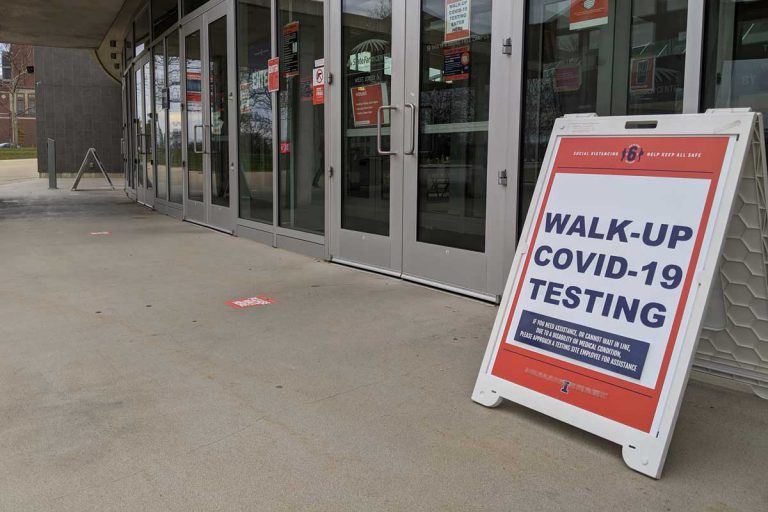URBANA – Within three weeks of having tens of thousands of students return to the University of Illinois at Urbana-Champaign for the spring semester, the campus had identified more than 450 cases of COVID-19.
This is fewer than half the number of cases identified by the same time last fall — and lower than U of I epidemiologist Becky Smith says she expected to see.
But an uptick in new daily cases starting last week was a cause for concern.
“[The cases] are, as far as we can tell, related to social activity being increased,” Smith says. “So, people were really good for the first couple of weeks back, and now we’re seeing they’re relaxing their guard a little. And we can’t do that. This virus won’t give us an inch.”
The biggest change in the Urbana campus’ testing protocol this semester was the requirement that students quarantine until receiving two negative tests.
Smith says she believes that helped identify positive cases among students returning to campus after winter break — and prevent them from spreading.
But there were other factors as well: the Shield T30 program ensures that those receiving positive tests are contacted within 15 minutes of receiving the result and instructed to immediately isolate.
Plus, “students are a little bit more used to the process,” Smith says. “We’ve also built up a lot more tools on the back end… as far as being able to look at the data and being able to understand what’s going on.”
Smith says, as far as she’s heard, the “most egregious” student behaviors that the campus saw last semester — such as students partying while knowingly infected — are not happening this semester.
She says she’s hopeful that the rollout of the vaccine could eventually make the campus’ mass-testing program unnecessary. Certain campus employees doing in-person work are now eligible to sign up for an appointment to get the vaccine through the Champaign-Urbana Public Health District.
But while the vaccines have been found to be safe and effective for preventing serious illness from the virus, it remains unclear whether they stop people from contracting it and transmitting it to others. And until that’s been shown to be the case, Smith says the Urbana campus’ SHIELD program — with mass-testing and other mitigations — will continue.
The campus’ ongoing research study — for those who opt in — will soon begin collecting data through monthly surveys on which vaccines people have received and whether being vaccinated offers protection from contracting the virus, Smith says.
In an email to the campus community on Feb. 5, U of I Chancellor Robert Jones said the university does not control the order or who receives the vaccine or the timelines, and he encouraged people to consult the university’s COVID-19 vaccination page for the most updated information.
“If you are eligible to make an appointment in this round, I hope you will strongly consider doing so,” Jones said in the email. “If you are not eligible to make an appointment this round, please be patient.”
“The distribution of a vaccine is welcome news, but we must continue to be as diligent as ever in safety precautions, including regular COVID-19 testing, wearing face coverings, social distancing, hand washing and avoiding large gatherings.”
Questions about the coronavirus vaccine can also be directed to C-U Public Health by phone (217-239-7877) or email (coronavirus@c-uphd.org).
Christine Herman is a reporter at Illinois Public Media. Follow her on Twitter: @CTHerman

